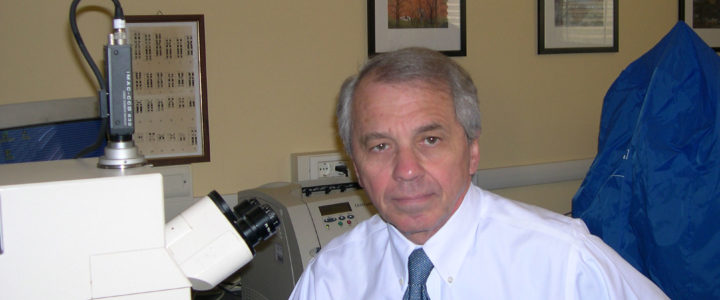With a $35,000 grant from FRAXA Research Foundation, Dr. Nicole Tartaglia from the University of Colorado Denver and Tracey Stackhouse aimed to develop neuromotor outcome measures for use in clinical trials in FXS, and to contribute to a deeper understanding of the neuromotor issues involved in FXS. This collaborative project was completed at the two sites of the Colorado Fragile X Clinic: The Children’s Hospital and Developmental FX. Dr. Nicole Tartaglia is the Medical Director of the Fragile X Clinic at The Children’s Hospital of Denver. Tracy Murnan Stackhouse, MA, OTR is the co-founder of the Developmental & Fragile X Resource Centre (Developmental FX), a clinic specializing in Fragile X.
Read moreTreatment Targets
The Role of FMRP and Small, Non-Coding RNAs in Translation

With a $120,000 grant from FRAXA Research Foundation, Drs. Henri Tiedge and Jun Zhong studied the mechanisms by which local protein translation is repressed. Multiple parallel mechanisms keep protein synthesis in check; one of them involves FMRP, and a similar mechanism involves the non-coding RNA, BC1. Results published.
Read moreSmall Molecule Modulators of Lithium for Treatment of Fragile X Syndrome

With a $219,500 grant from FRAXA Research Foundation, Dr. Stephen Haggarty from Havard/MIT developed a high-throughput drug screen to find compounds that inhibit GSK3, a critical enzyme in Fragile X. He looked for compounds that can accomplish this either alone or in combination with lithium, offering the possibility of enhancing the effectiveness of lithium as a treatment. His drug screen used patient-specific neural progenitor (NP) cells derived from human induced pluripotent stem cells (iPSCs) – which are created from cells in a skin biopsy from people with Fragile X syndrome (FXS) and other autism spectrum disorders.
Read moreDeveloping Fragile X Treatments in Fruit Flies and Mice

With a $380,000 grant from FRAXA Research Foundation from 2005-2009, Drs. Sean McBride, Tom Jogens, and Catherine Choi studied one of the most important aspects of FRAXA’s research; the preclinical validation of potential therapeutic strategies. Many labs have found new leads for treatment. However, very few have the capacity to test new drugs in the mouse model to establish efficacy rigorously enough to lead to clinical trials. The McBride lab (in a broad collaboration with the Choi, Jongens, and Skoulakis groups) aims to do just that. Results published.
Read moreGenome-wide Epigenetic Markers in Fragile X

With $45,000 in grants from FRAXA Research Foundation over several years, Dr. Miklos Toth of Cornell University studied epigenetics (ie factors other than the gene itself) which can determine symptom severity in Fragile X.
Read moreRole of Matrix Metalloproteinases (MMP-9) in Fragile X

With a $220,000 grant from FRAXA Research Foundation over 3 years, Dr. Iryna Ethell from the University of California at Riverside studied the regulation of dendritic structure by matrix metalloproteinases and other extracellular signaling pathways. This work identified a major treatment strategy for Fragile X with the available MMP-9 inhibitor, minocycline.
Read moreNovel Functions of Drosophila FMRP

With a $120,000 grant from FRAXA Research Foundation over 2 years, Dr. Thomas Dockendorff from the University of Tennessee and his colleagues were pioneers in using the power of fly genetics to understand the different functions of the fly version of the Fragile X protein.
Read moreBasic Mechanisms of Disease and Potential Therapeutic Strategies

With $245,000 in grants from FRAXA Research Foundation, Dr. Stephen Warren and his lab at Emory University studied all aspects of Fragile X syndrome, from the mechanisms of repeat expansion to high-throughput drug screens in the Drosophila model of Fragile X. The Warren lab made the original discovery of the Fragile X gene, FMR1, in collaboration with the Nelson and Oostra labs, and is recognized internationally as a leader in molecular genetics. Recent projects include establishment of induced pluripotent stem cell lines from Fragile X patients, and determination of other forms of mutation in the Fragile X gene, other than the most common trinucleotide repeat expansion.
Read moreGlutamate Metabolism in Fragile X Mouse Brain

With a $95,000 grant from FRAXA Research Foundation over 2 years, Mary McKenna at the University of Maryland studied the role of metabotropic glutamate receptors (mGluR) and how they affect other cells and pathways.
Read moreUsing Fenobam to Reduce APP and Abeta in Fragile X Mice

With a $130,000 grant from FRAXA Research Foundation over 2008-2009, Drs. James Malter and Cara Westmark at the University of Wisconsin studied the relationship between the Fragile X protein FMRP and APP, a protein important to the pathology of Alzheimer’s Disease. APP may also contribute to the pathology of Fragile X, and its major metabolite, Aß, may contribute to abnormal protein synthesis via a positive feedback loop. This project sought to restore normal dendritic protein synthesis in Fragile X mice by breaking into this loop.
Read moreAMPAkines and BDNF in Fragile X: UCI Researchers Restore Memory Process in Fragile X

With a $104,498 grant from FRAXA Research Foundation from 2003-2008, Dr. Julie Lauterborn at the University of California has done several studies on dentritic spines and finding treatment targets for memory retention in Fragile X mice.
Read moreTargeting the Role of Group 1 Metabotropic Glutamate Receptors

With a $40,000 grant from FRAXA Research Foundation in 2008, Dr. Huibert Mansvelder and his team at the University of Amsterdam studied the role of different receptors and their reactions to drug compounds.
Read moreEffects of Alternative Splicing at FMR1 Exon 15 on Understanding Fragile X Syndrome

With a $118,500 grant from FRAXA Research Foundation from 2007-2008, Dr. Robert Denman and his team at the New York State Institute for Basic Research studied protein splicing, specifically looking at exon 15-encoded residues of of FMPR.
Read moreIn Vitro Reactivation of the Fragile X Gene

With a $60,000 grant from FRAXA Research Foundation, Dr. Giovanni Neri and his team at Universita Cattolica del S. Cuore explored reactivation of the FMR1 gene and characterization of cell lines with unmethylated full mutation.
Read moreFRAXA Contributes $10,000 to NIH grant to Seaside Therapeutics

Randy Carpenter, MD Principal Investigator with Mark Bear, PhD, MIT Co-Investigator (2007) conducted a clinical development of mGluR5 antagonists to treat Fragile X Syndrome and Autism. Seaside Therapeutics received a major grant from the NIH, with additional funding from FRAXA and Cure Autism Now (CAN) to develop STX107, a selective mGluR5 antagonist, as a treatment for Fragile X. Unfortunately, Seaside has since discontinued development of STX107.
Read moreTaurine and Somatostatin as Potential Treatments for Fragile X Syndrome: A Unifying Neuro-Endocrine Hypothesis
With a $74,000 grant from FRAXA Research Foundation, Dr. Abdeslem El Idrissi at CUNY explored the GABA receptor system in Fragile X mice and tested somatostatin and taurine as potential therapies for Fragile X; while somatostatin must be infused intravenously, taurine is available as a nutritional supplement.
Read moreDecreased Excitatory Drive onto Parvalbumin-Positive Neocortical Inhibitory Neurons in a Mouse Model of Fragile X Syndrome

With an $80,000 grant from FRAXA Research Foundation over 2006-7, Drs. Jay Gibson and Kimberly Huber at the University of Texas at Southwestern examined if the defected inhibitory neurotransmission was a primary or secondary symptom of Fragile X to determine where future treatment targets should be focused.
Read moreElectrophysiological, Biochemical and Immunohistochemical Characterization of Kv3.1 in Auditory Brainstem Nuclei in the Fragile X Knockout Mouse

With $80,000 in funding from FRAXA over several years, the Yale University team of Leonard Kaczmarek, PhD showed that loss of FMRP leads to an increased Kv3.1 potassium currents. This change impairs timing of action potentials in auditory neurons (and likely others throughout the brain).
Read moreBaclofen: GABA(B) Receptor Supersensitivity and Normalization of Behavioral Abnormalities by Various GABA(B) Agonists Including Baclofen in FMRP Deficient Mice

With $110,000 in grants from FRAXA Research Foundation over several years, Dr. Miklos Toth from Cornell University discovered increased startle response in Fragile X mice and that baclofen can correct this phenotype.
Read moreHypothalamic Pituitary Adrenal (HPA) Axis Dysregulation in Fragile X Syndrome

The hypothalamic pituitary adrenal (HPA) axis is our central stress response system. FRAXA Research Foundation awarded Dr. Carolyn B. Smith $62,000 in funding in 2005 to explore the HPA axis in Fragile X mice. The results of their study indicate that, in FVB/NJ mice, the hormonal response to and recovery from acute stress is unaltered by the lack of Fragile X mental retardation protein. Results published.
Read moreTherapeutic Interventions in FMR1 Knockout and Transgenic Mice: Role of the FMR1 Gene

With a $229,000 grant from FRAXA Research Foundation in 2006, Drs. Richard Paylor, David Albeck, and Francis Brennan at the Baylor College of Medicine found that, in mice as in humans, the level of Fragile X protein in brain cells plays a prominent role in determining levels of activity and anxiety.
Read moreExamining the Amygdala in Mouse Models of Fragile X

With a $63,000 grant from FRAXA Research Foundation in 2006, Dr. Joseph LeDoux and his team at New York University studied the role of the amygdala in Fragile X syndrome using mouse models.
Read moreSocial Deficits in Fragile X Syndrome: Do Gene-Gene Interactions Play a Role?

With a $100,000 grant from FRAXA Research Foundation from 2005-2006, Drs. Jean Lauder and Sheryl Moy at the University of North Carolina looked for gene-gene interactions in Fragile X syndrome.
Read morePharmacologic Interventions in the Fmr1 KO Mouse

With $48,600 in grants from FRAXA Research Foundation over 2004-2006, Dr. Catherine Choi at Drexel University studied Fragile X knockout mice to determine future treatment targets for Fragile X syndrome in humans.
Read moreComposition and Dynamics of FMRP-Containing RNP Complexes

FRAXA Research Foundation funded a grant of $30,000 in 2005 to Dr. Barbara Bardoni at INSERM in France. The team works on the biochemistry of the Fragile X protein.
Read more
